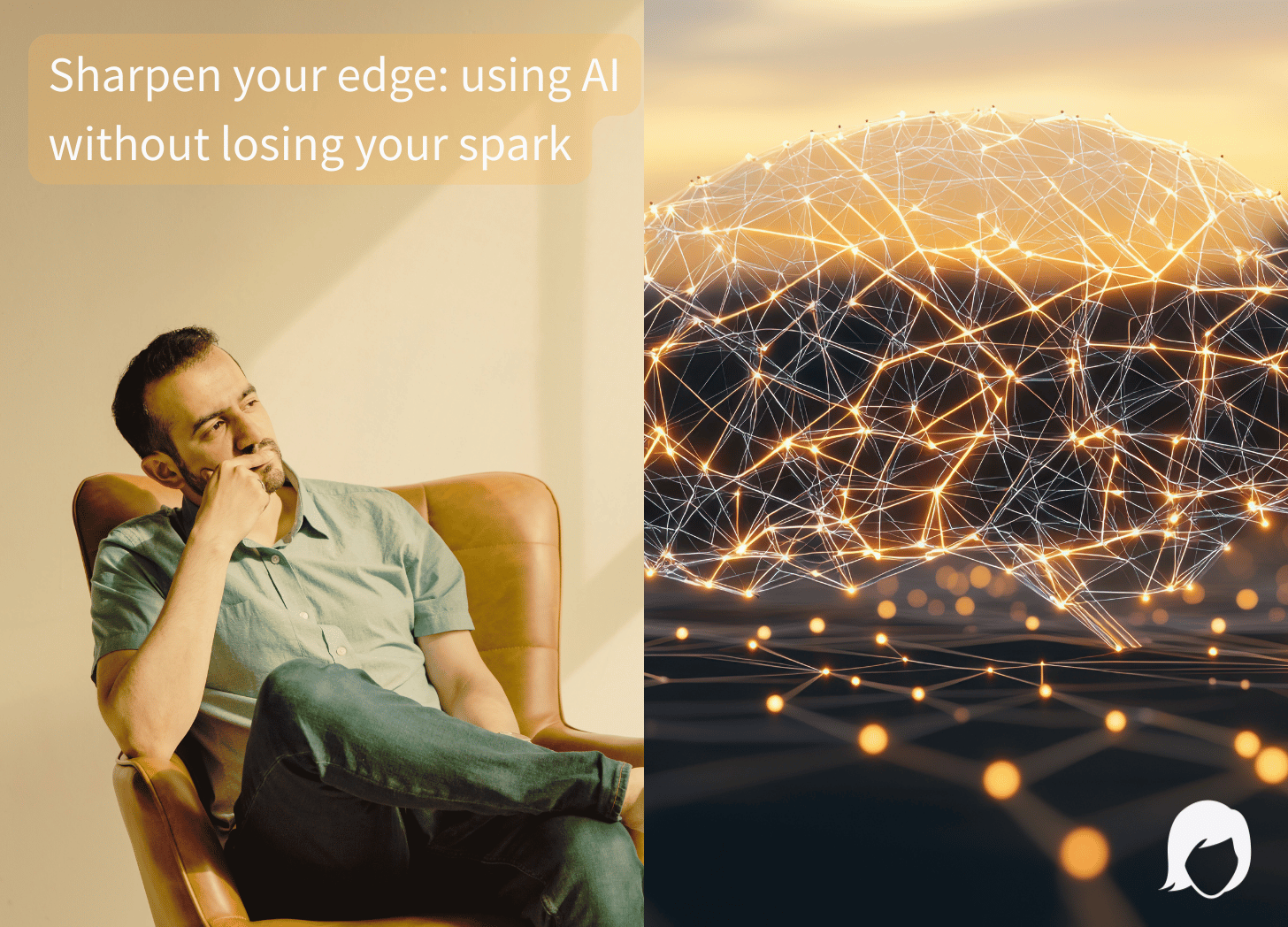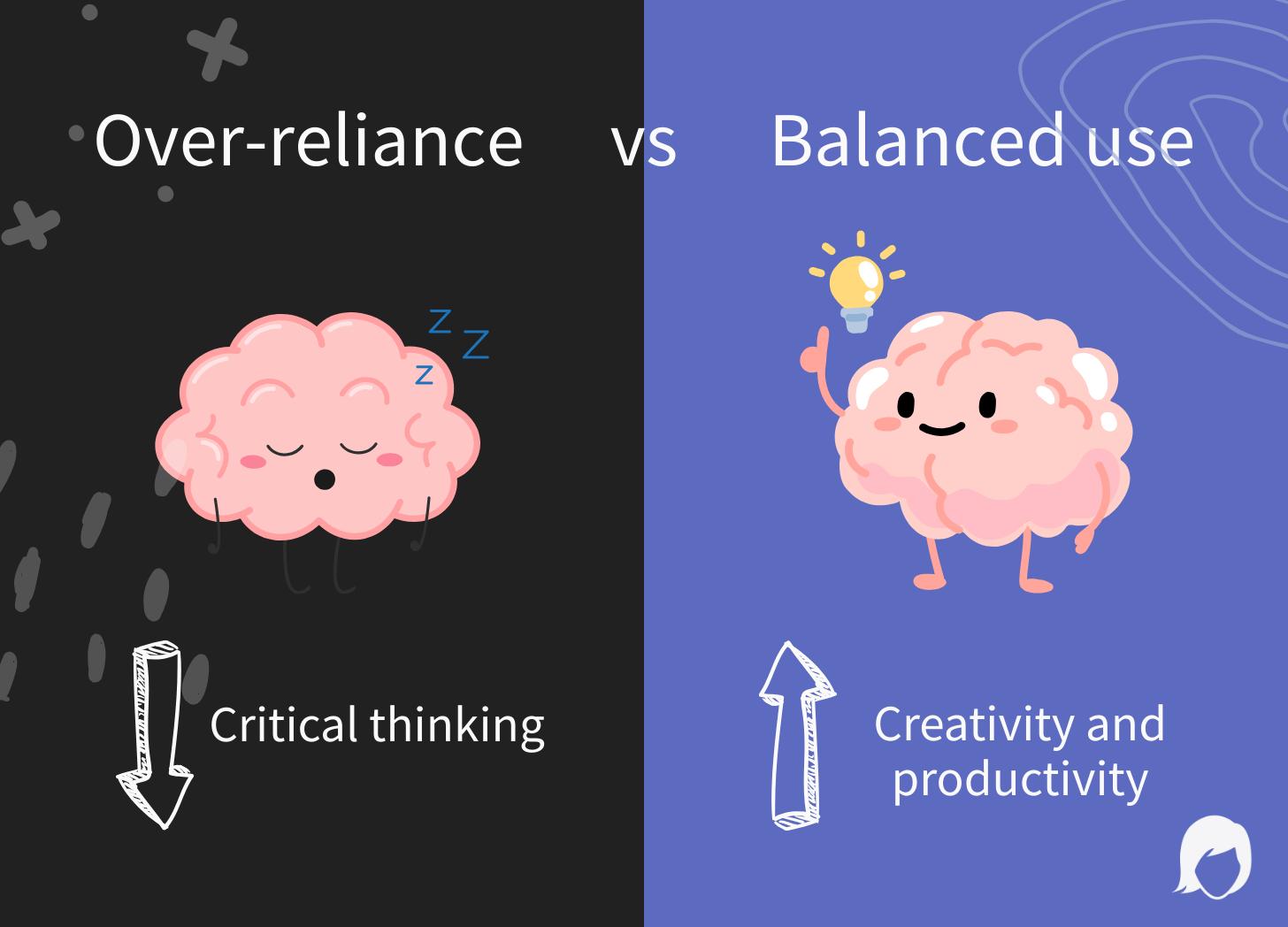Does ChatGPT make you lazy or smarter?
How to use ChatGPT as a thinking partner without losing your creativity and critical edge
I once caught myself wondering: if I let ChatGPT brainstorm or draft for me, am I actually saving time or quietly outsourcing my brain? That question has been coming up more and more among professionals who pride themselves on their curiosity and creativity. We all want the convenience, but none of us want to lose the spark that makes our work feel alive. So, the real question isn’t should we use ChatGPT, it’s how we can use it without losing our edge.
That’s where the research comes in. Studies from MIT, Microsoft, and Carnegie Mellon are starting to show both the risks and rewards of working alongside AI, and the results are more nuanced (and more useful) than the “AI makes you lazy” headlines suggest.
What the science really says
So, does ChatGPT actually make us “dumber”? The short answer: it depends.
A team at MIT’s Media Lab1 followed participants who used ChatGPT for writing tasks over several months. They found that people who leaned heavily on copying AI-generated text word-for-word became less engaged. Their work started to sound flat and formulaic, and they recalled less of what they had written. In other words, over-reliance seemed to dull memory and creativity.
Similarly, a study from Microsoft and Carnegie Mellon University2 revealed that people who trusted AI outputs too much stopped double-checking facts. Instead of questioning or creating, they spent more time passively consuming information.
I had this moment not long ago when I was researching for an AI Sally article about the release of ChatGPT-5. I asked the model to outline specific improvements compared to the previous version. It confidently rattled off a list of “quick facts”, such performance boosts across different benchmarks. At first glance, it sounded impressive. But when I asked for the sources behind those claims, ChatGPT admitted it had none. In fact, it even told me the details were “made up and should not be used.” That little exchange was a good reminder: AI can be helpful, but you can’t just take its word as gospel. Staying sharp means fact-checking, even when the answer looks polished on the surface.
Yet the research also points to a brighter possibility. Studies in education and business settings3 shows that when ChatGPT is used intentionally (treated as a collaborator rather than a replacement) it can actually spark creativity, help people push through “blank page” blocks, and even improve learning outcomes.
Think of it like a calculator: great for handling complex sums, but you wouldn’t want to lose your ability to do everyday maths in your head.
Does ChatGPT make us lazy?
The honest truth is that it can. If you use it as a crutch for every little task, you risk sliding into passive mode. But when you choose it as a partner, that is, someone (or something) to bounce ideas off, AI can make you sharper.
One way to think about it is cooking. Pre-chopped vegetables might save you prep time, but you still decide the recipe, the seasoning, and how you serve it. ChatGPT can do the chopping, but you bring the flavour.
Not long ago, I used ChatGPT to help me pull together a rough budget, suppliers and materials list for some work we were planning on our back deck. What would have taken me hours of research and spreadsheet-wrangling, ChatGPT handled in seconds. The best part was that it freed me up to focus on the parts of the project I actually enjoy - playing with the design and aesthetics. That experience reminded me how valuable AI can be when it takes care of the heavy lifting, leaving us with more energy for the creative work only we can do.
How to use ChatGPT without losing your creativity
So how do you get the best of both worlds: efficiency without losing your creative edge? Here are some approaches you can try.
Start with ChatGPT, finish with your own words.
AI is excellent for first drafts, outlines, or lists of options. But the real value comes when you rewrite in your own voice. This strengthens memory, helps you absorb the ideas more deeply, and makes sure your work reflects your lived experience.
Ask deeper and better questions.
Instead of accepting the first answer, dig further. Ask “why might this be wrong?” or “how would this look from another angle?” That curiosity is what keeps your brain active, and it often leads to insights AI couldn’t generate on its own.
Add your personality.
Bring in humour, metaphors, or your own stories. These human touches are what make writing memorable. Readers (and colleagues) respond to warmth and authenticity, not perfect grammar.
Keep your judgment front and centre.
When accuracy matters, check the facts. ChatGPT can be confidently wrong. By applying your own judgment, especially in professional or ethical contexts, you keep responsibility where it belongs: with you.
Make space for AI-free thinking.
Try sketching, free-writing, or talking ideas through with a friend before you open ChatGPT. Those unplugged moments often produce the sparks that make your work stand out.
A friend of mine who works in interior design recently told me how she uses AI almost like a creative sounding board. She brings her own instincts and ideas to a client brief but then asks AI to help her think through tricky challenges, like how to balance a ceiling fan with a pendant light in a dining room or how to create the effect of wall sconces without wiring. The AI doesn’t replace her expertise, but it broadens the range of possibilities, suggesting both practical and decorative options she might not have considered. She then curates the best of these ideas to suit the client’s style and space, which makes her process faster, more creative, and ultimately more valuable.

The creativity debate: can AI itself be creative?
Some argue that AI is creative because it generates original-sounding outputs. But in truth, ChatGPT works by remixing patterns in its training data. That means it can surprise us, but it doesn’t have intent or meaning behind its words. The “why” and the “so what” still belong to us.
This is where human creativity shines. We give context, emotion, and connection, things no model can replicate.
For more on this balance between human and machine strengths, see my earlier piece on You’re not too late: why now is the best time to build AI confidence - even if you’re not a ‘tech person’.
Why stories matter most
One reader recently shared that ChatGPT helped her organise her thoughts after years of feeling stuck. But her real breakthrough came when she combined AI drafts with her own stories from everyday life. Suddenly, her work felt like her again.
That’s the key: AI can help you move faster, but your story is what makes the work meaningful.
Explore further
If this sparks your curiosity, you might also enjoy:
Each of these dives deeper into using AI with confidence, without giving up your judgment or creativity.
Final thoughts
ChatGPT won’t make you lazy or kill your creativity unless you let it. If you use it as a shortcut for everything, you’ll risk going flat. But if you treat it as a sparring partner - someone to help you think, not think for you - it can help you grow sharper, faster, and freer.
I’d love to hear from you. Have you had moments where ChatGPT either made you feel “lazy,” or helped you discover a new spark of creativity? Leave a comment and share your experience - we learn best from each other.
Kosmyna, N., Hauptmann, E., Yuan, Y. T., Situ, J., Liao, X.-H., Beresnitzky, A. V., Braunstein, I., & Maes, P. (2025, June). Your brain on ChatGPT: Accumulation of cognitive debt when using an AI assistant for essay writing task [Preprint]. arXiv. https://doi.org/10.48550/arXiv.2506.08872
Hao-Ping (Hank) Lee, Advait Sarkar, Lev Tankelevitch, Ian Drosos, Sean Rintel, Richard Banks, and Nicholas Wilson. 2025. The Impact of Generative AI on Critical Thinking: Self-Reported Reductions in Cognitive Effort and Confidence Effects From a Survey of Knowledge Workers. In Proceedings of the 2025 CHI Conference on Human Factors in Computing Systems (CHI '25). Association for Computing Machinery, New York, NY, USA, Article 1121, 1–22. https://doi.org/10.1145/3706598.3713778
Desdevises, Joy. (2025). The paradox of creativity in generative AI: high performance, human-like bias, and limited differential evaluation. Frontiers in Psychology, Vol 16 2025. https://10.3389/fpsyg.2025.1628486




